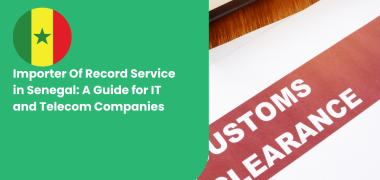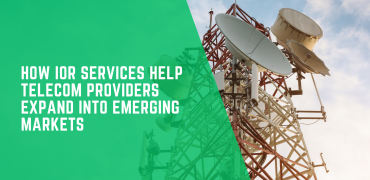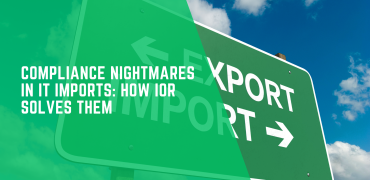Senegal, located on the west coast of Africa, is an emerging market with a growing demand for advanced IT and telecom infrastructure. For IT and telecom companies looking to expand into Senegal, understanding the local import regulations, duties, taxes, and necessary permits is essential. Engaging an Importer of Record (IOR) service can simplify the importation process, ensure compliance with local laws, and facilitate the smooth entry of IT and telecom equipment into Senegal. This guide provides a comprehensive overview of the IOR service, the import duties and taxes applied to IT and telecom equipment, and the special permits and approvals required for successful importation.
Understanding the Importer of Record Service
The Importer of Record (IOR) is a designated entity responsible for ensuring that imported goods comply with local laws and regulations. The IOR handles all the necessary documentation, customs clearance, and payment of duties and taxes on behalf of the importer. For IT and telecom companies looking to expand into Senegal, engaging an IOR service can simplify the complex importation process and mitigate the risks associated with non-compliance.
Benefits of Using an Importer of Record Service
- Compliance with Local Regulations: The IOR ensures that all imported goods comply with Senegal’s local laws and regulations, reducing the risk of delays, fines, or seizures.
- Streamlined Importation Process: The IOR handles all the administrative tasks associated with importation, including documentation, customs clearance, and payment of duties and taxes.
- Cost and Time Efficiency: By leveraging the expertise of an IOR, IT and telecom companies can save time and reduce costs associated with navigating the complex importation process.
- Risk Mitigation: The IOR assumes responsibility for compliance, minimizing the risk of legal issues or penalties for the importing company.
Import Duties and Taxes on IT and Telecom Equipment
Importing IT and telecom equipment into Senegal involves several duties and taxes. Understanding these financial obligations is crucial for budgeting and financial planning.
- Customs Duties: Customs duties are levied on imported goods based on their classification and value. The rates for IT and telecom equipment can vary, so it is important to classify the products accurately to determine the applicable duty rates. Generally, customs duties on electronic goods in Senegal range from 5% to 20%, depending on the specific product category.
- Value Added Tax (VAT): Senegal applies a Value Added Tax (VAT) on imported goods. As of the latest update, the standard VAT rate in Senegal is 18%. This tax is calculated based on the CIF (Cost, Insurance, and Freight) value of the goods, plus any applicable customs duties.
- Excise Duties: Some specific IT and telecom products may be subject to excise duties. These are additional taxes imposed on certain goods, often to discourage their use or to raise additional revenue. However, excise duties are typically not common for standard IT and telecom equipment.
- Surtax and Additional Levies: Senegal may impose additional levies or surtaxes on certain imports, especially those considered luxury items or those that can significantly impact the local economy. It’s essential to verify if any such levies apply to specific IT and telecom products.
Special Permits and Approvals
Importing IT and telecom equipment into Senegal may require obtaining special permits and approvals from relevant authorities. This ensures that the imported goods meet the necessary safety, quality, and regulatory standards.
- Type Approval and Certification: IT and telecom equipment must often undergo type approval and certification processes to ensure they meet local technical and safety standards. This involves testing and certification by accredited bodies such as the Autorité de Régulation des Télécommunications et des Postes (ARTP).
- Radio Frequency Licensing: For telecom equipment that uses radio frequencies, obtaining a radio frequency license from the local regulatory authority is mandatory. This ensures that the equipment does not interfere with existing communication networks. ARTP is the body responsible for issuing these licenses.
- Environmental and Safety Compliance: Certain IT and telecom products may need to comply with environmental and safety regulations. This includes adherence to standards related to electromagnetic compatibility (EMC), electrical safety, and hazardous substances. Compliance with the Restriction of Hazardous Substances (RoHS) Directive is also significant.
- Import Licenses and Permits: Depending on the type of equipment being imported, specific import licenses or permits may be required. This is particularly relevant for high-value or sensitive telecom equipment. The Ministry of Trade and Industry is typically involved in issuing these permits.
The Importation Process
The importation process for IT and telecom equipment into Senegal involves several key steps. Engaging an IOR service can simplify these steps and ensure compliance with local regulations.
- Pre-Importation Preparation:
- Product Classification: Accurately classify the IT and telecom equipment to determine the applicable customs duties and taxes.
- Documentation: Prepare all necessary documentation, including commercial invoices, packing lists, certificates of origin, and product specifications.
- Permits and Approvals: Obtain the required permits and approvals from relevant authorities.
- Shipping and Logistics:
- Freight Forwarding: Choose a reliable freight forwarder to handle the transportation of goods to Senegal.
- Insurance: Ensure the shipment is adequately insured to cover potential risks during transit.
- Customs Clearance:
- Customs Declaration: Submit the customs declaration along with the necessary documentation to the customs authorities in Senegal.
- Duties and Taxes: Pay the applicable customs duties, VAT, excise duties, and any other taxes.
- Post-Importation Compliance:
- Product Testing and Certification: Ensure the imported IT and telecom equipment undergoes any required testing and certification processes.
- Regulatory Reporting: Comply with any post-importation regulatory reporting requirements.
Key Steps for Importing IT and Telecom Equipment into Senegal
- Product Classification and Documentation: The first step in the importation process is to accurately classify the IT and telecom equipment to determine the applicable customs duties and taxes. Prepare all necessary documentation, including commercial invoices, packing lists, certificates of origin, and product specifications.
- Obtaining Permits and Approvals: Depending on the type of equipment being imported, specific permits and approvals may be required. This may involve obtaining type approval and certification from ARTP, radio frequency licenses, and any necessary environmental and safety compliance certificates.
- Shipping and Logistics: Choose a reliable freight forwarder to handle the transportation of goods to Senegal. Ensure that the shipment is adequately insured to cover potential risks during transit.
- Customs Declaration and Clearance: Submit the customs declaration along with the necessary documentation to the customs authorities in Senegal. Pay the applicable customs duties, VAT, excise duties, and any other taxes.
- Product Testing and Certification: Ensure that the imported IT and telecom equipment undergoes any required testing and certification processes. This may involve testing for electromagnetic compatibility (EMC), electrical safety, and compliance with hazardous substances regulations.
- Regulatory Reporting: Comply with any post-importation regulatory reporting requirements. This may involve submitting reports to the relevant authorities on the imported equipment’s compliance with local regulations.
Choosing the Right Importer of Record Service
Selecting the right IOR service provider is crucial for the successful importation of IT and telecom equipment into Senegal. Consider the following factors when choosing an IOR service:
- Expertise and Experience: Look for an IOR service provider with expertise and experience in handling IT and telecom equipment. They should be familiar with the specific regulations and requirements for these products.
- Compliance Record: Check the compliance record of the IOR service provider. Ensure they have a proven track record of successfully navigating the importation process and complying with local regulations.
- Range of Services: Choose an IOR service provider that offers a comprehensive range of services, including documentation, customs clearance, payment of duties and taxes, and obtaining necessary permits and approvals.
- Reputation and References: Research the reputation of the IOR service provider and seek references from other IT and telecom companies that have used their services.
- Cost and Value: Consider the cost of the IOR service in relation to the value they provide. While cost is an important factor, it should not be the sole criterion for selection. The value of their expertise and ability to ensure compliance should also be taken into account.
Conclusion
For IT and telecom companies looking to expand into the promising market of Senegal, understanding the importation process and engaging a reliable Importer of Record (IOR) service is essential. The IOR service simplifies the complex importation process, ensures compliance with local regulations, and mitigates the risks associated with non-compliance. By leveraging the expertise of an IOR, IT and telecom companies can focus on their core business activities while successfully navigating the importation landscape in Senegal. With careful planning, compliance with local regulations, and the right IOR service provider, IT and telecom companies can seize the opportunities in Senegal and achieve their business objectives.




